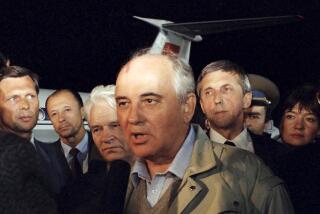Khrushchev, Rusk: Sons’ Recollections : Fathers’ Roles in War and Peace Assessed in Books Out Next Week
WASHINGTON — Dean Rusk and Nikita S. Khrushchev, two leaders of the Cold War, now have something else in common: sons who are offering assessments of their fathers’ roles in both war and peace.
Richard Rusk, in what he calls “my attempt to know my aging father,” interviewed the former secretary of state for long hours with a tape recorder rolling.
Sergei Khrushchev, describing himself at one point as “a witness to my father’s meditations,” chronicled the last seven years in the life of the Soviet leader who was driven from power in 1964.
“As I Saw It” by Dean Rusk as told to Richard Rusk will be published June 25 by W. W. Norton & Co.
“Khrushchev on Khrushchev: An Inside Account of the Man and His Era” by Sergei Khrushchev is scheduled for June 28 publication by Little, Brown & Co.
Nikita Khrushchev was a coal miner’s son who rose through the ranks of the Soviet bureaucracy, holding power for 11 years as Communist Party chief and six years as premier before being deposed. He died in 1971.
Rusk, 81, lives in Athens, Ga. He was secretary of state from 1961 to 1969 and was, as his son says, “an architect of a war that killed 58,000 Americans and nearly a million Vietnamese.”
He was with President John F. Kennedy at the summit in Vienna in June, 1961, when, in his words, Khrushchev “set out to intimidate this new, young President of the United States.”
Sergei Khrushchev’s view is different: “The main thing I recall happening at Vienna was that the two men got acquainted. Father returned to Moscow after the summit with a very high opinion of Kennedy.”
Rusk encountered Khrushchev again after going to Moscow in July, 1963, to initial a limited atomic test ban treaty. At the Soviet premier’s villa on the Black Sea, they batted a badminton shuttlecock back and forth with no net and no lines on the ground.
After his downfall, Khrushchev was all but forgotten in the Soviet Union--pictured, his son recalls, as “a dimwitted hooligan cast upon the throne by fate.” Only recently has the rehabilitation of his image begun.
Rusk, although he held office longer than any secretary of state since Cordell Hull and retired to an honored professorial chair in his native Georgia, had his detractors too.
Historian Arthur M. Schlesinger, a Kennedy White House aide, found him “the perfect No. 2 man”--”a baffling leader” who had “authority but not command.” As Richard Rusk sees it, Schlesinger was suggesting “that Rusk wasn’t smart enough for the job.”
Staying on in the Johnson Administration after Kennedy’s death, the State Department veteran became increasingly a target for opponents of the Vietnam War.
More to Read
Sign up for Essential California
The most important California stories and recommendations in your inbox every morning.
You may occasionally receive promotional content from the Los Angeles Times.









